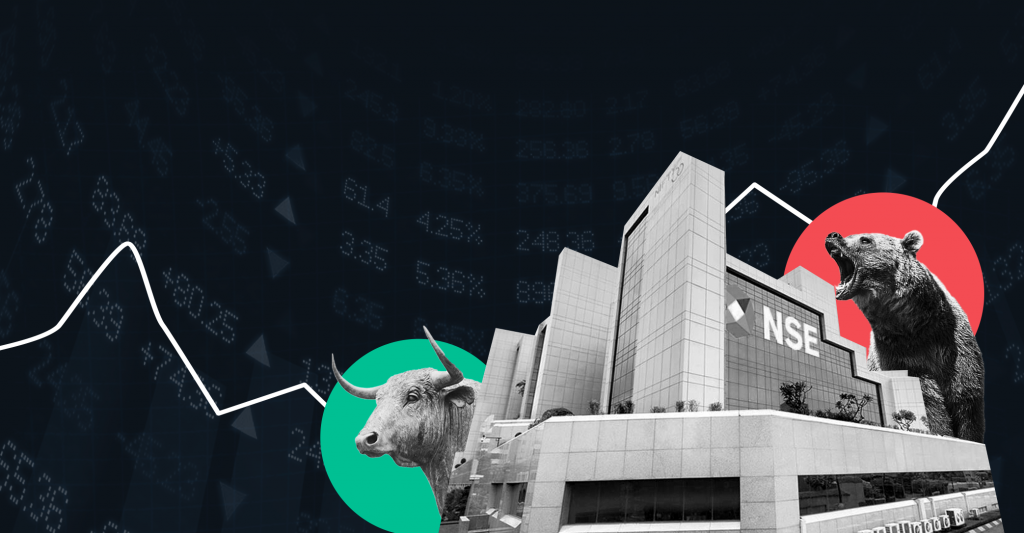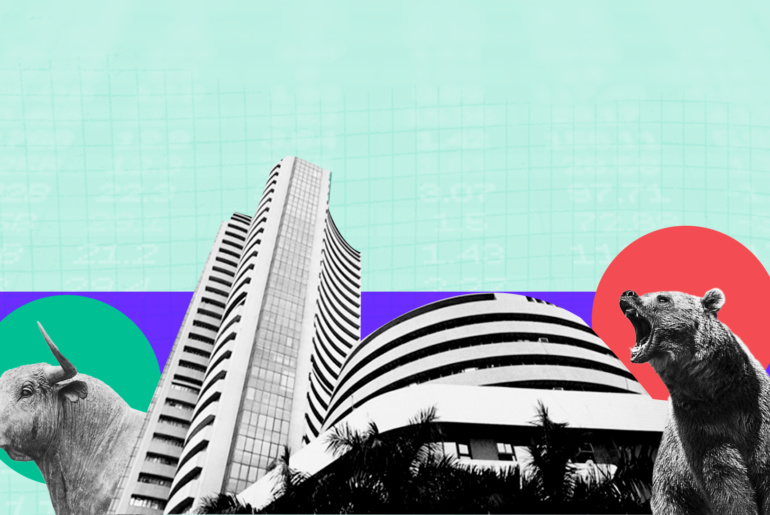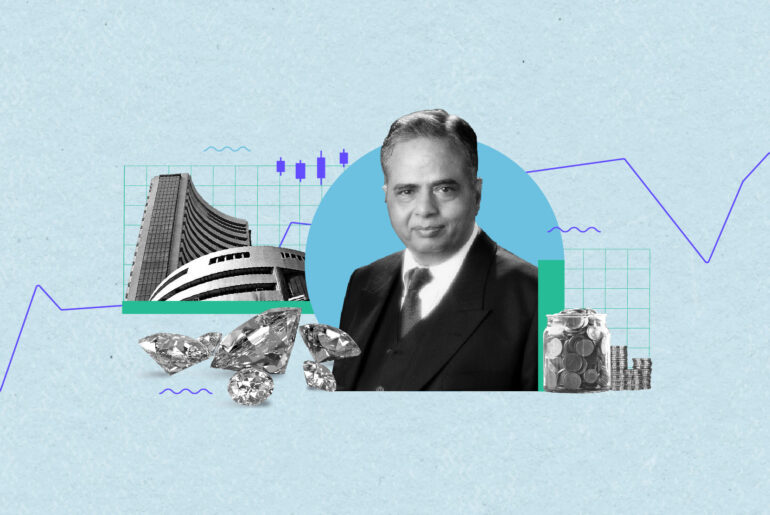Last Updated on Sep 1, 2022 by Aradhana Gotur
Think stock exchanges in India and the most common names that spring to mind are the Dalal Street or The Bombay Stock Exchange (BSE), and the National Stock Exchange (NSE). But did you know the Indian stock exchange is not limited to these two names only?
There are seven different types of stock exchanges in India. But before we jump to the list of stock exchanges in India, let’s quickly understand what a stock exchange is. It is a place where investors can trade – buy and sell – stocks and other securities. In simple terms, a stock exchange is a kind of marketplace for stocks and securities. Now that you know the meaning, let’s understand how many stock exchanges are there in India.
This article covers:
- BSE Limited
- NSE Limited
- Calcutta Stock Exchange Limited
- Indian Commodity Exchange Limited
- Metropolitan Stock Exchange of India Limited
- Multi Commodity Exchange of India Limited
- National Commodity and Derivatives Exchange of India Limited
- Which stock exchange should you choose?
Table of Contents
BSE Limited
Types of securities traded: equity and equity derivatives, currency derivatives, interest rate derivatives, commodity derivatives, and debt
The Bombay Stock Exchange, or Dalal Street, is the oldest stock exchange in India. Established in 1875, BSE boasts of being the largest exchange in India. BSE’s current market cap is Rs 5,981.25 cr as of 20th Jul 2021.
The main index of the BSE is the S&P BSE Sensex that tracks the performance of the 30 largest and most active stocks listed on the exchange. Some of the other popular BSE indices include BSE MIDCAP, BSE 100, BSE SMALL CAP, BSE 200, BSEMetal, BSEAuto, among others.
The Indian Clearing Corporation Limited (ICCL) is a fully-owned subsidiary of BSE. It acts as a counterparty for all trades happening on BSE and facilitates trade settlements. BSE Institute Limited is the educational arm of BSE that aims to educate investors about the capital markets.
NSE Limited
Types of securities traded: equity and equity derivatives, currency derivatives, interest rate derivatives, commodity derivatives, and debt
Established in 1992, the National Stock Exchange of India listed itself as an Indian stock Exchange in 1993 under the provisions of the Securities Contract Regulations Act. NSE was the one to introduce trading in dematerialized format. It offered investors the facility of automatic screen-based trading for ease and convenience.
The benchmark index of NSE is the Nifty-50 which is a very popular parameter for investors in India as it tracks the top 100 of the market’s best performers – heavyweights that can influence the course of the market movement.
Derivative trading was introduced by NSE in the year 2000, and today, the Futures and Options market has wide participation. NSE has also facilitated the establishment of the National Securities Depository Limited (NSDL) that allows investors to trade electronically, in Demat form, for ease of buying and selling securities.
Calcutta Stock Exchange Limited
Types of securities traded: equity and equity derivatives, currency derivatives, interest rate derivatives, commodity derivatives, and debt
The Calcutta Stock Exchange is the second oldest stock exchange in India. It was established in the year 1908 in Calcutta, hence the name. Presently, the Calcutta Stock Exchange operates out of Lyons Range in Calcutta.
CSE was recognised as a stock exchange in the year 1956 under the Securities Contract (Regulations) Act, 1956. Later on, in the year 1997, the traditional trading system was replaced with the screen-based trading system introduced by the NSE.
Even though the exchange grinded to a halt after it was rocked by the Ketan Parekh scam, the organization has been revived and sees renewed investor participation and interest, and is now a professional exchange, much like the BSE and NSE.
Indian Commodity Exchange Limited
Types of securities traded: Commodity derivatives
Called ICEX in short, the Indian Commodity Exchange is a platform for trading in commodity derivatives. The exchange was registered with SEBI in Aug 2017 and is headquartered in Mumbai. ICEX boasts of being the only exchange in the world that deals in diamond derivative contracts, introduced with effect from 2017.
Metropolitan Stock Exchange of India Limited
Types of securities traded: equity and equity derivatives, currency derivatives, interest rate futures, commodity derivatives, and debt
Also called MSE in short, the Metropolitan Stock Exchange was formed in the year 2008. Headquartered in Mumbai, MSE is involved in the activity of a clearing house. It helps in the clearance and settlement of trade contracts that involve multiple types of asset classes.
SEBI recognized MSE as a notified exchange in 2012. In May 2013, MSE launched its index called SX40 which is a free-float index comprising 40 large-cap stocks from the different segments of the economy.
Multi Commodity Exchange of India Limited
Types of securities traded: Commodity derivatives
Another exchange that is primarily meant for trading in commodity derivatives, MCX began its operations in Nov 2003. MCX is listed on the BSE and NSE and it offers commodities for trade. Recently, MCX generated a considerable turnover of Rs 3,732 lakh cr and ranked 7th in the commodity exchanges globally. (Source: Moneymint)
MCX has introduced an app called ComRIS that helps in keeping the records of all the transactions routed through MCX.
National Commodity and Derivatives Exchange of India Limited
Types of securities traded: Commodity derivatives
Founded in Apr 2003, NCDEX is an online trading platform for commodity derivatives. Investors can buy and sell different types of commodities including pulses, agricultural produce, edible oils, and the like.
NCDEX provides a platform for trading in agricultural goods. Though headquartered in Mumbai, NCDEX allows traders to trade from all across India. It has a strong network of 50,000 terminals across 1,000 centres. The trading time starts from 10 AM and goes up to 11.30 PM, five days a week.
Which stock exchange should you choose?
With so many stock exchanges available, you might get confused about which one you should choose.
Well, there is no restriction when it comes to selecting a specific exchange from the list of stock exchanges in India. You can choose any exchange depending on your investment needs. If you want to invest in stocks, NSE, BSE or CSE would be suitable choices. You can go with BSE or NSE for their popularity and the availability of a wide variety of stocks.
On the other hand, if you want to trade in commodities, you need to choose exchanges that facilitate the trading of commodity derivatives, namely ICEX, MCX, and NCDEX.
That concludes our article on how many stock exchanges in India there are. Assess the different platforms and then make a choice depending on the type of asset that you want to invest in. Also, different stock exchanges have different timetables of operations, so getting an understanding of when you can make transactions will come in handy.
FAQs
1. What is a stock exchange?
Also called a bourse, a stock exchange is a place where investors and traders can buy and sell stocks and other securities.
2. Is a stock exchange regulated?
Yes, a stock exchange is regulated by market regulator SEBI – Securities and Exchange Board of India. It oversees the activities of all the market participants be it companies, brokers, investors or traders.
3. What are the timings of a stock exhange?
Share markets open at 9:15 am and close at 3:30 pm. Markets are only open on weekdays and are closed on major public holidays.




